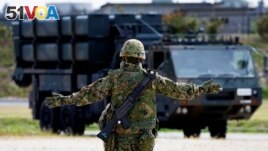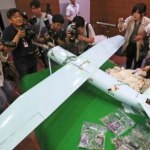Under a new National Security Strategy (NSS) and other documents, Japan will nearly double its defense spending and deploy missiles in a new way.
根据新的国家安全战略和其它文件,日本将把国防开支增加一倍,并以新的方式部署导弹。
Since the end of World War II, Japan's military, called the Japan Self-Defense Forces, has held defensive, not offensive weapons.
自二战结束以来,被称为日本自卫队的日本军队一直持有防御性武器,而不是进攻性武器。
Under a new defense spending plan, Japan aims to purchase missiles that can hit military targets in other countries.
根据一项新的国防开始计划,日本计划购买能够打击其它国家军事目标的导弹。
The spending means the world's third-largest economy will no longer spend the ninth-most on weapons and defense.
这一支出意味着全球第三大经济体在武器和国防方面的支出将不再位居第九位。
The new plan will increase Japan's spending from one percent of its gross domestic product (GDP) to two percent over the next five years. If this happens, Japan will move to third in the world in defense spending.
新计划将在未来5年内将日本的支出从占国内生产总值的1%提高到2%。如果发生这种情况,日本的国防开支将位居世界第三。
Japan will center its early spending on what it calls "counterstrike capability," or the ability to hit targets in other countries.
日本将把早期支出集中在所谓的反击能力上,即打击其它国家目标的能力。
The move has been the subject of debate within in Japan, as the country's past guidelines restricted offensive weapons. Japan's constitution, written after World War II with American influence, bars it from making war.
由于日本过去的指导方针限制了进攻性武器,此举一直是日本国内争论的话题。二战后,深受美国影响的日本宪法禁止其发动战争。
The new defense ideas in the NSS note that having missiles that can hit foreign targets acts as a form of defense. But the new documents say striking first "remains impermissible."
新国家安全战略中的全新防御思想指出,拥有能够打击外国目标的导弹是一种防御形式。但是这些新文件称,先发制人仍然是不被允许的。
Japan's military says it will purchase hundreds of U.S.-made Tomahawk missiles, which can travel up to 2,500 kilometers.
日本军方表示将购买数百枚美国制造的战斧导弹,其射程可达2500公里。
The new defense plan was developed because Japan believes that the security situation in the region is at its "most severe and complex" since the end of World War II.
制定新的防御计划是因为日本认为该地区的安全局势处于二战结束以来最严峻和最复杂的状态。
Military experts say Japan's leaders are concerned that Russia's 2022 invasion of Ukraine may set an example for other nations to follow.
军事专家表示,日本领导人担心俄罗斯2022年入侵乌克兰可能为其它国家树立了榜样。
Public opinion studies in Japan have shown support for the nation's new military plan.
日本民意调查显示,日本的新军事计划得到了支持。
Jake Sullivan is the National Security Advisor to the U.S. president. He called Japan's new plan "bold."
杰克·沙利文是美国总统的国家安全顾问。他称日本的新计划“大胆。”
But leaders in China, North Korea and Russia denounced the plan. Russia criticized the plan as unrestricted "militarization."
但是中国、朝鲜和俄罗斯领导人谴责了该计划。俄罗斯批评该计划是不受限制的军事化。
James Brown is a professor at Temple University in Tokyo. He is a political science expert. Brown called the criticism "without foundation," meaning that it is not grounded in facts.
詹姆斯·布朗是东京天普大学的教授。他是政治学专家。布朗称这种批评是没有根据的,意思是它没有事实依据。
He noted that Russia, North Korea and China all have many long-range missiles.
他指出,俄罗斯、朝鲜和中国都拥有许多远程导弹。
I'm Dan Friedell.
我是丹·弗里德尔。(51VOA.COM原创翻译,请勿转载,违者必究!)











